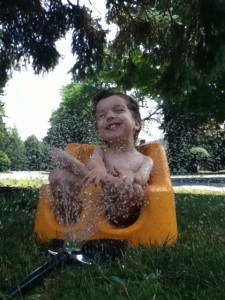[Note from the Oscar Ensemble Oscar Goes: A Wheelchair Accessible Van Benefit, Saturday October 6, 5-8 pm, Dyer Arts Center, NTID (RIT campus). See the VAN page for details!]
by David
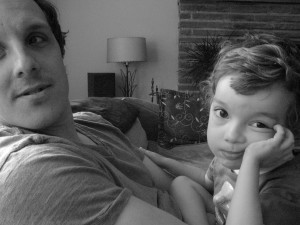 The impetus for this blog post began a few months after Oscar began using his power wheelchair. Oscar began using the bottom of his wrist instead of his hand to toggle the joystick (which is the steering mechanism) of his power wheelchair. I immediately asked Oscar why he was using his wrist in place of his hand and suggested he use his hand. I also immediately realized I was overreacting, projecting my own fears that maybe he is already losing hand strength, instead of allowing him to improvise in whatever way he deems fit as he navigates through his world. I chose to correct him. Luckily I was able to catch myself shortly after a small pang of guilt. I was being reminded by my boy that I needed to exercise some patience, first, as a parent, second as a parent of a boy with SMA.
The impetus for this blog post began a few months after Oscar began using his power wheelchair. Oscar began using the bottom of his wrist instead of his hand to toggle the joystick (which is the steering mechanism) of his power wheelchair. I immediately asked Oscar why he was using his wrist in place of his hand and suggested he use his hand. I also immediately realized I was overreacting, projecting my own fears that maybe he is already losing hand strength, instead of allowing him to improvise in whatever way he deems fit as he navigates through his world. I chose to correct him. Luckily I was able to catch myself shortly after a small pang of guilt. I was being reminded by my boy that I needed to exercise some patience, first, as a parent, second as a parent of a boy with SMA.
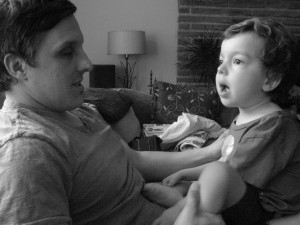 The presumption that a power wheel chair now changes everything about Oscar having SMA without any further physical restrictions, of course is an unreasonable expectation. Oscar still has muscle weakness, he always will, it is the nature of SMA. Oscar has difficulty raising his head should it drop forward and more often than not needs assistance lifting it back up. Oscar gets fatigued toward the end of the day thus complicating his mobility whether he is in his power wheelchair or sitting on the couch trying to lift his arms while playing with his toys. Impatience. Panic. Understandable, right? You long for normal, even the newly assumed normal we have integrated into our lives by way of power chairs, standers and respiratory equipment. Believing that Oscar should be able to just go without additional barriers, to be able to revel in his newfound independence, for the most part is possible. Yet when placed against some of the realities of SMA no amount of equipment can actually change Oscar having the disease; the equipment (in this case a power wheelchair) can only alter the way Oscar navigates his world. However, Oscar using his wrist instead of his hand to steer his wheelchair, also reminded me, simply having this device and being a pretty quick teach doesn’t leave him exempt from having to LEARN how to use it. If Oscar were able to walk—wouldn’t he fall or bump into things, or drag his feet when tired? Of course he would. Why then as Oscar’s parents does applying some patience prove challenging?
The presumption that a power wheel chair now changes everything about Oscar having SMA without any further physical restrictions, of course is an unreasonable expectation. Oscar still has muscle weakness, he always will, it is the nature of SMA. Oscar has difficulty raising his head should it drop forward and more often than not needs assistance lifting it back up. Oscar gets fatigued toward the end of the day thus complicating his mobility whether he is in his power wheelchair or sitting on the couch trying to lift his arms while playing with his toys. Impatience. Panic. Understandable, right? You long for normal, even the newly assumed normal we have integrated into our lives by way of power chairs, standers and respiratory equipment. Believing that Oscar should be able to just go without additional barriers, to be able to revel in his newfound independence, for the most part is possible. Yet when placed against some of the realities of SMA no amount of equipment can actually change Oscar having the disease; the equipment (in this case a power wheelchair) can only alter the way Oscar navigates his world. However, Oscar using his wrist instead of his hand to steer his wheelchair, also reminded me, simply having this device and being a pretty quick teach doesn’t leave him exempt from having to LEARN how to use it. If Oscar were able to walk—wouldn’t he fall or bump into things, or drag his feet when tired? Of course he would. Why then as Oscar’s parents does applying some patience prove challenging?
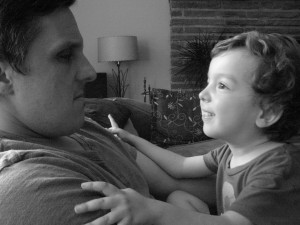 Perhaps there is an element of fear. We want him to remain as strong as possible for as long as possible. We want the number of obstacles already present as a result of Oscar’s SMA to be less of an issue now that he is able to zoom with his power wheel chair. And that’s just it— he is able. However he is still a 3 and ¾ year old boy (Oscar is always reminding us of the ¾ when we say he is 3) who will sometimes get tired, will get distracted, will want to play, will want to test all of the ways he can and might steer his wheelchair.
Perhaps there is an element of fear. We want him to remain as strong as possible for as long as possible. We want the number of obstacles already present as a result of Oscar’s SMA to be less of an issue now that he is able to zoom with his power wheel chair. And that’s just it— he is able. However he is still a 3 and ¾ year old boy (Oscar is always reminding us of the ¾ when we say he is 3) who will sometimes get tired, will get distracted, will want to play, will want to test all of the ways he can and might steer his wheelchair.
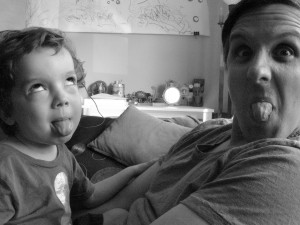 As parents we have to be flexible, just like any other set of parents. Perhaps trusting in Oscar’s abilities versus his disability is crucial and I do think as his parents we are pretty consistent in doing so. All of his abilities that aren’t related to SMA per se such as his advanced verbal skills, drawing/artistic abilities, cognitive thinking are astonishing and easy for us to revel in. We are careful never to take these for granted and we are always quick to share our genuine enthusiasm, yet we’ve come to expect these abilities from Oscar. Although the various physical challenges of the disability prove unpredictable, sometimes trying to interpret what is fatigue or muscle weakness and what is the temperament of a 3 and ¾ yr old boy also enters the parenting equation for us. This requires some troubleshooting and of course as parents we are not exempt from trying to meet the needs of our child. It just so happens the physical challenges are inherent at this point as a result of Oscar’s SMA. Maybe the advanced verbal and cognitive skills are as well.
As parents we have to be flexible, just like any other set of parents. Perhaps trusting in Oscar’s abilities versus his disability is crucial and I do think as his parents we are pretty consistent in doing so. All of his abilities that aren’t related to SMA per se such as his advanced verbal skills, drawing/artistic abilities, cognitive thinking are astonishing and easy for us to revel in. We are careful never to take these for granted and we are always quick to share our genuine enthusiasm, yet we’ve come to expect these abilities from Oscar. Although the various physical challenges of the disability prove unpredictable, sometimes trying to interpret what is fatigue or muscle weakness and what is the temperament of a 3 and ¾ yr old boy also enters the parenting equation for us. This requires some troubleshooting and of course as parents we are not exempt from trying to meet the needs of our child. It just so happens the physical challenges are inherent at this point as a result of Oscar’s SMA. Maybe the advanced verbal and cognitive skills are as well.
Perhaps these words can serve as a reminder that patience with ourselves as parents is necessary. Oscar being Oscar is the most rewarding reminder.
(To comment on a post click the title of the post and a comment box will appear at the bottom of the post. Fill in name and email to the left of where it says, “name” and “email.”)
